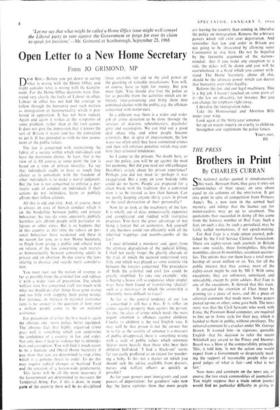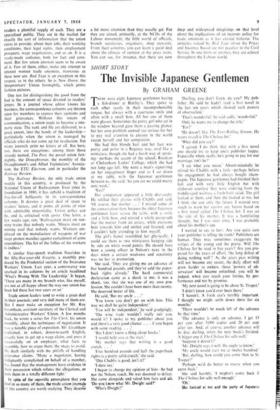THE PRESS
Brothers in Print
By CHARLES CURRAN
Sm national dailies quoted it simultaneously this week. Between them, they gave it sixty-six column-inches of their space; an area about equal to six columns of the SPECTATOR. It got into print in spite of competition from Princess Anne's 'flu, a new turn in the corned beef mystery, and tidings that the licence age for motor-cyclists may go up to seventeen. The quotations that succeeded in doing all this came from the January number of Red Tape. Such a feat, on such a day, by such a periodical, may be fairly called momentous, if not epoch-making.
For Red Tape is a trade union journal, pub- lished by the Civil Service Clerical Association. There are eighty-seven such journals in Britain now—one weekly, three fortnightlies, fifty-five monthlies, eleven bi-monthlies, seventeen quarter- lies. The unions that run them have a total mem- bership of seven million or so. Yet, for all the public interest that they arouse, most of the eighty-seven might be run by MI 5. With some exceptions, they are unknown, unnoticed, and unreadable, except by print addicts. Red Tape is one of the exceptions. It showed that this week.
It attracted the attention of Fleet Street by printing (a) a piece of news, and (b) a piece of editorial comment that made news. Some papers picked up one or other, some gave both. The news story was that the Civil Servants who work with Ernie, the Premium Bond computer, are required to line up in Army style for their pay, which is handed to them in public, without envelopes. The editorial comment lit a cracker under Mr. George Brown. It warned him—in vigorous, quotable English --that his decision to refer the recent Whitehall pay award to the Prices and Incomes Board was a blow at the comparability principle. This, it told him, 'is not the action one would expect from a Government so desperately need- ing the support of reasonable people who are good judges of what is fair—and what is not fair.'
Now news and comment on the news are, of course, the two stock commodities of journalism You might suppose that a trade union journal would find no particular difficulty in giving its
readers a plentiful supply of each. They are a specialised public. They are in the market for exactly the sort of information that the union exists to provide; about their jobs, their working conditions, their legal rights, their employment prospects, wage negotiations, and so on. It is a ready-made audience, both for fact and com- ment. But few union journals seem to be aware of it. Few of them, either, make any attempt to
interest women trade unionists, numerous as these now are. Red Tape is an exception in this respect, as in the others. So is New Dawn, the Shopworkers' Union fortnightly, which prints fashion pictures.
One test for distinguishing the good from the bad is the amount of space devoted to readers' letters. In a journal whose editor knows his business, the correspondence columns are thrown open for members to express their opinions and their grievances. Without this means of communication, a union tends to become a one- party state. The rank and file are delivered, to a
great extent, into the hands of the leadership—
particularly when the union is managed by officials who do not come up for re-election. Yet many journals print no letters at all. But here,
too, there are exceptions; among them those already named, The Post, the postal union fort- nightly, the Draughtsman, the monthly of the Draughtsmen's and Allied Technicians' Associa- tion, the ETU Electron, and in particular the Railway Review.
The Railway Review, the only trade union weekly in this country, is produced by the
National Union of Railwaymen. Ever since its foundation in 1880, it has upheld a tradition of free-for-all bellicosity in its correspondence columns. It devotes a great deal of space to readers' letters, and it prints all points of view with admirable impartiality. Union policy can be, and is, criticised with gusto. One letter, a few weeks ago, ran, 'Railwaymen insist on run- ning trains that nobody wants. Miners insist on mining coal that nobody wants. Workers em- ployed on the manufacture of weapons of war stage protest marches against curtailment of arms expenditure. The list of the follies of the workers is endless.'
A similar free-speech tradition flourishes in the fifty-five-year-old Gazette, a monthly pro-
duced by the Prudential section of the Insurance Workers' Union. Last year, a controversy was sparked in its columns by an article headlined 'What's Wrong With The Leadership.' It began, 'There are many in my branch who, like myself, are not at all happy about the way our union has been led these last two years or so.'
Trade union leaders tend to write a great deal in their journals; and very dull many of them are. But I must make an exception for Mr. Roy Grantham, assistant secretary of the Clerical and Administrative Workers' Union. A few months back, he wrote a series for The Clerk, his union monthly, about the techniques of negotiation. It V.as a notable piece of exposition. Mr. Grantham explained, in robust, down-to-earth English, exactly how to get up a wage claim, and press it successfully on an employer; what facts to assemble, how to argue them, the snags to avoid. He dealt similarly with the pitfalls of handling grievance claims. 'Many a negotiator, having indignantly complained on behalf of a member, has found that the management have evidence in their possession which refutes the allegations, or Puts them in a totally different light.'
In spite of the soporific atmosphere that you find in so many of them, the trade union journals of this country are worth studying. They deserire a lot more attention than they usually get. For they are aimed, primarily, at the NCOs of the Labour movement; the little world of officials, branch secretaries, organisers, shop stewards. From their columns, you can learn a good deal about the climate of opinion at the grass roots. You can see, for instance, that there are now
deep and widespread misgivings on that level about the implications of an incomes policy for trade unionism as it has existed hitherto. The anxieties voiced by Red Tape about the Prices and Incomes Board are not peculiar to the Civil Service. In one form or another, they are echoed throughout the Labour world.































 Previous page
Previous page